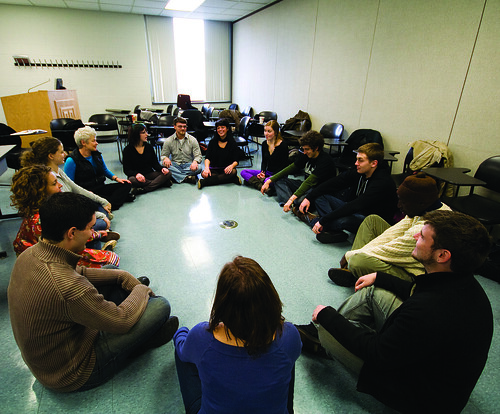At the beginning of the semester, I dragged my reluctant roommate, junior psychology major Cana Sarnes, into the only class being offered that piqued my interest. The class, an honors history and religion course titled Refuge and Refugees: Contemplating Asylum, is taught by history professor Kathleen Biddick.
Ten minutes into the first class, Cana turned to me and said, “I’m definitely taking this class.”
That day, my roommate and I, along with 11 other students, embarked on our semester-long community-oriented, educational, emotional and spiritual journey through this new-age pedagogy.
Our class consisted of an intellectual, intuitive and humanitarian professor and students.
The community we built became a place of refuge from our daily lives as university students, and we fostered a strong bond in which we were comfortable enough to explore global and domestic issues spiritually, emotionally and mentally.
“This class is very much a group endeavor, a collaborative effort for each of us to center ourselves physically, mentally and emotionally in order to think deeply about humanitarian issues,” said Tony Keddie, a senior religion major. “In this class, [the] professor, students and guests are able to look at their world objectively while being distinctly subject to their own convictions.”
Guests from the university and Philadelphia community, including refugees, a dancer, a cantor, a meditation leader and various professors spoke to the class.
We studied the history of concepts of refuge and asylum in Judaism, Christianity, Islam, Buddhism and other faiths. Other materials studied include the philosophical writings of Immanuel Kant, the Geneva Convention and the International Cities of Refuge Network. Also investigated were cases from films about the Israeli-Palestinian conflict, the genocide in Srebenicá and the suffering in Tibet.
Contemplation, which occurred at the beginning of each class, was a favored component of the course.
Biddick or a student would lead the contemplation. Sources of contemplation ranged from poems, religious texts, music, word slams and finger painting.
We once performed a walking meditation, in which we linked arms with a partner and slowly walked the halls of the Tuttleman Learning Center.
We gained many stares and smirks from fellow students we encountered on our walk, just as we did the second day of class when we danced in front of the elevators on the fourth floor with assistant dance professor Jillian Harris.
We were all in class and learning. We weren’t just sitting in a room being lectured to and copying notes from a PowerPoint presentation.
The class contemplated on peace and war and everything in between. Important values such as love, acceptance, understanding and forgiveness exist in our community.
We have grown as individuals and as a community in our understanding of ourselves and the world around us. Contemplation had an invaluable impact on all of us and our ability to comprehend, analyze and reflect on issues pertinent to each individual.

“Professor Biddick has given us the opportunity to learn in a truly innovative environment,” said Zack Groff, a freshman political science major. “Temple is at the foreground when it comes to technological innovation, but the unique pedagogy of this class is much more valuable.”
“I think contemplation offers a unique insight toward other peoples’ own train of thought and how they perceive the world,” said Paul Kuhne, a senior political science and Spanish major. “There’s nothing more moving than a group of people quietly contemplating the depths of human compassion.”
This class, however, has been unique from the start. The course was initially approved by the university, but Biddick applied for and received a fellowship from the Fetzer Institute, a nonprofit foundation that supports contemplation in higher education by funding Contemplative Practice Fellowships.
“Compassion, hospitality and scholarship can go together,” Biddick said, “thanks to the wonderful students in our class who are living proof of this.”
According to the Fetzer Institute, its mission to “foster awareness of the power of love and forgiveness in the emerging global community rests on the conviction that efforts to address the world’s critical issues have to go beyond political, social and economic strategies to their psychological and spiritual roots.”
“This class has ultimately offered a path to discovering the true compassion and beauty of human nature through meditation and its application to refugee crises,” Kuhne said. “Putting aside limitations and bureaucracy, our contemplation of asylum has led me to believe that interpersonal and simple human kindness frequently can surpass the roadblocks found in complicated frameworks like the Geneva Convention.”
We became companions on a journey of epic proportions, searching for peace in a busy university and for awareness and knowledge of our world, Keddie said. In this class, students find asylum through contemplation, which transforms the university from an oppressing force to a peaceful place of refuge.”
“In our classroom, students have solidified their worldviews based on academic contemplation in a peaceful atmosphere,” Keddie said. “We are a group of ambitious students finding peace in our own lives, and we are eager to help others do the same.”
Kathryn A. López can be reached at kathryn.lopez@temple.edu.



Be the first to comment